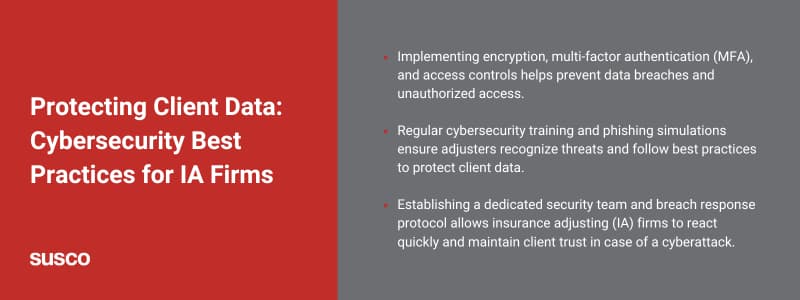
Securing Your Data: Best Practices for Insurance Adjusters
IA firms handle sensitive client data daily, making them prime targets for cyber threats. A single data breach can compromise client trust, lead to regulatory penalties, and disrupt business operations.
Strengthening data security in claims systems is not just about compliance—it’s about protecting your firm’s reputation and ensuring seamless service for policyholders.
Why Data Security Matters in Claims Systems
Claims management systems store confidential client details, including financial records, personal identification, and claim histories. This information is highly vulnerable to cyberattacks, fraud, and unauthorized access without robust security measures.
Protecting this data is essential for maintaining compliance, safeguarding clients, and ensuring smooth business operations.
Potential Consequences of Data Breaches for IA Firms and Their Clients
A data breach can have far-reaching consequences, affecting both IA firms and their clients. Key risks include:
- Financial losses: Cyberattacks such as ransomware can lead to costly disruptions and legal penalties.
- Reputation damage: Clients lose confidence in firms that fail to protect their sensitive information.
- Regulatory consequences: Non-compliance with security regulations may result in fines and operational restrictions.
To mitigate these risks, IA firms must adopt proactive security measures that safeguard client data and maintain industry compliance.
How Data Security Impacts Trust and Reputation
A well-secured claims system signals professionalism, reliability, and a commitment to client protection. Firms implementing strong security practices build trust with clients, ensuring long-term success and a positive industry reputation.
Understanding Common Cyber Threats
Cybercriminals are constantly evolving their tactics to exploit vulnerabilities in IA firms. Some of the most significant threats include:
- Phishing: Fraudulent emails trick employees into revealing sensitive information.
- Ransomware: Malicious software encrypts company data, demanding a ransom for release.
- Unauthorized access: Weak passwords and unsecured systems enable bad actors to steal or manipulate data.
Claims systems are particularly susceptible to cybersecurity risks due to the volume of sensitive data they process.
Common vulnerabilities include:
- Third-party access vulnerabilities: Vendors or partners with weak security measures can expose your system.
- Cloud-based storage risks: Improperly configured cloud solutions may lead to data leaks.
- Insider threats: Employees or contractors misusing their access can compromise security.
Several high-profile incidents highlight the consequences of inadequate data security:
- Major insurance carriers have faced ransomware attacks that exposed millions of customer records.
- Small IA firms have suffered from phishing scams, leading to fraudulent claims and financial losses.
- Data leaks from unsecured cloud storage have resulted in compliance violations and legal action.
Using this information, IA firms can take proactive steps to safeguard their systems and protect client information from cyber threats.
Building Strong Data Security Measures
Protecting sensitive claims data requires a proactive approach to cybersecurity. IA firms must implement layered security strategies to prevent breaches, safeguard client trust, and comply with industry regulations.
By focusing on encryption, access controls, authentication protocols, and regular system updates, firms can strengthen their defenses against evolving cyber threats.
Securing Data With Encryption and Access Controls
Encryption is essential for protecting data from unauthorized access. End-to-end encryption ensures that data remains secure both at rest and in transit, preventing cybercriminals from intercepting sensitive information.
Implementing role-based access controls further enhances security by limiting system privileges based on an employee’s job responsibilities.
Enhancing Security with Multi-Factor Authentication (MFA)
MFA provides an additional layer of security beyond traditional passwords. Requiring two-factor authentication for all system logins significantly reduces the risk of unauthorized access, even if credentials are compromised.
Keeping Software Secure With Updates and Patch Management
Keeping software up to date is a critical part of maintaining cybersecurity.
Security patches should be applied as soon as they become available to close vulnerabilities that cybercriminals could exploit.
Developing an Effective Incident Response Plan
Even with strong security measures in place, firms must be prepared to respond to breaches quickly and effectively. Establishing a dedicated cybersecurity response team ensures that security incidents are handled efficiently.
Strengthening data security requires ongoing commitment and adaptation to emerging cyber risks.
Practical Tactics and Strategies for IA Firms
Implementing strong cybersecurity measures requires a combination of regular assessments, employee education, and secure technology.
IA firms can significantly reduce their risk exposure by taking the following proactive steps:
- Conduct routine security audits and penetration testing. Regular audits identify vulnerabilities in claims systems, while penetration testing simulates cyberattacks to expose weak points before hackers exploit them.
- Train adjusters on data security best practices. Employees are the first line of defense against cyber threats. Providing mandatory cybersecurity training, running phishing simulations, and enforcing security policies ensure staff members recognize and prevent potential attacks.
- Leverage secure claims management software and cloud-based solutions. Choosing software with built-in encryption, role-based access controls, and compliance certifications adds an extra layer of protection. Cloud providers should follow strict security protocols to prevent unauthorized data access.
- Develop an incident response plan to mitigate breaches quickly. Establishing a dedicated cybersecurity response team and a step-by-step breach response protocol ensures swift action in case of a security incident. Quick response reduces damage, restores operations faster, and maintains client trust.
By adopting these strategies, IA firms strengthen their cybersecurity posture, protect client data, and ensure long-term business resilience in an increasingly digital world.
Secure Your Claims System With Susco
Cyber threats are constantly evolving, and protecting client data is non-negotiable. Strengthen your claims management security with proactive solutions designed for IA firms.
Schedule a free consultation with Susco Solutions today to assess your cybersecurity needs and fortify your systems against potential breaches.
Don’t wait until an attack happens—take action now to safeguard your firm’s future.